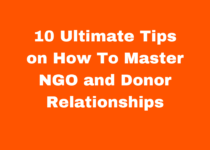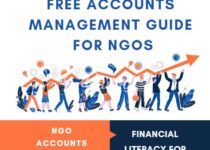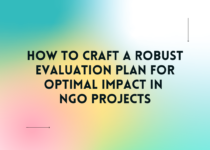Top 5 Essential Writing Tips for NGOs: Master the Art of Writing
Introduction: Top 5 Essential Writing Tips for NGOs, People engage in writing for diverse reasons, driven either by a genuine passion for the craft or out of professional necessity. In many occupations, writing becomes a fundamental aspect, involving tasks such as correspondence, email communication, narrative development, report generation, proposal drafting, and formal letter composition. Despite the widespread need for writing skills, many individuals secretly harbor a desire to enhance their abilities but struggle to find a starting point. If you find yourself in this category, yearning for straightforward insights, you’ve landed on the perfect spot.
Writing, akin to building muscle strength, improves through consistent practice and application. Assuming you have a basic understanding of sentence construction, this article bypasses the fundamentals and offers quick, practical tips to enhance your writing clarity and effectiveness. The goal is to empower you to communicate proficiently without altering the essence and purpose of your writing endeavors.
To begin with, I will try keep as simple as possible so that anyone new to writing can easily get along with the pointers mentioned below.
Here are Top 5 Essential Writing Tips for NGOs: Master the Art of Writing
Tip Number One: Write with Authenticity, The essence of writing lies in conveying your thoughts and messages in a way that is genuinely understandable. Attempting to impress or use fancy language often backfires, pushing readers away rather than drawing them in. Authentic expression is what truly resonates with people, capturing their interest and earning their sincere attention.
Embracing simplicity holds immense power. Clear, expressive sentences not only engage readers but also carry a compelling voice. It’s essential to develop your unique writing style; drawing inspiration from others is beneficial, but the key to making a mark is refining your own style continually as you learn and grow.
Tip Number Two: Write with Impact, Clarity in writing should never be confused with dullness; it’s not about lacking flavor but avoiding excessive seasoning. Think of it like spicing up a dish – too little, and it’s tasteless; too much, and it’s ruined. Injecting a touch of vigor into your words can make a world of difference. Seek out synonyms to invigorate your sentences. Over time, some words lose their luster through excessive use, and it’s important to keep your language fresh and engaging.
Take the simple example of “thank you.” It’s a phrase we all use daily. Yet, by replacing it with expressions like “truly appreciate your assistance” or “thanks a ton,” you convey a deeper sense of gratitude for the help received. This simple practice doesn’t just apply to common phrases; it can enhance your overall writing. By choosing words that resonate with your audience and maintaining a balanced use of language, you’ll become a more effective and impactful writer.
Top 5 Essential Writing Tips for NGOs: Master the Art of Writing
Tip Number Three: Master Seamless Transitions, Mastering the art of transitioning between thoughts is a critical skill, ensuring that readers stay engaged without losing context. It’s imperative to practice creating clear transitions from one paragraph to another, especially when the topic shifts. The next paragraph might introduce a different idea, making seamless transitions essential.
Various types of transition words serve specific purposes, such as suggesting ideas, highlighting contrasts, adding information, indicating time or space, conceding points, illustrating concepts, drawing similarities, emphasising key points, showcasing consequences, summarising, and providing details.
The flow of ideas in sentences should follow a logical sequence, avoiding confusion for readers. Writers should cultivate the ability to express their thoughts coherently, ensuring a smooth flow rather than a jumbled mess. Once you’ve mastered the skill of transitioning, you can effortlessly convey a multitude of ideas within a single piece, capturing your readers’ attention effectively.
Top 5 Essential Writing Tips for NGOs: Master the Art of Writing
Tip Number Four: Embrace Simplicity in Language, Becoming a proficient writer involves a crucial choice: opting for words that resonate genuinely with your readers instead of ones that merely showcase your writing prowess. While elaborate vocabulary might seem impressive, it often fails to convey the intended message clearly to a wider audience, especially those unfamiliar with intricate language.
Steer clear of flashy or jargon-laden words; not everyone has the luxury to repeatedly consult a dictionary while reading your work. Time constraints make it essential to communicate directly without hindrance. Simple, easily understood words always stand as the readers’ preference.
Moreover, consider employing synonyms thoughtfully. Substituting words strategically can infuse your writing with freshness without sacrificing clarity, ensuring your message reaches your audience effectively.
Tip Number Five: The Crucial Role of Editing, Achieving effectiveness in your work hinges on the process of meticulous editing. Repeated assessment is essential to identify and rectify any flaws before the final version is completed. To accomplish this, it’s imperative to allocate ample time for editing well before any deadline looms. Planning ahead is a wise strategy, involving thorough checks for spelling errors, grammatical inconsistencies, and simplicity of language, smooth flow, seamless transitions, and clarity of thought.
Editing is a dynamic process, and seeking external input is often invaluable. Friends or peers can provide a fresh perspective during proofreading; they may spot errors that are easily overlooked when reviewing one’s own work. Revising your work not only ensures clarity and precision but also allows for the possibility of approaching the topic from an entirely new perspective, sometimes necessitating a complete rewrite. While not a constant occurrence, it is a possibility that can significantly enhance the overall quality of your writing.
Top 5 Essential Writing Tips for NGOs: Master the Art of Writing
On a closing note, here are practical steps that can swiftly propel you from being merely a writer to becoming an effective one.
- Write Diligently: The path to becoming a proficient writer begins with consistent practice. Engage your mind by writing regularly; this routine will acquaint your brain with the nuances of crafting better sentences and conveying thoughts effectively. Consider starting with a daily journal, or, if time is limited, challenge yourself to compose even a single sentence daily. The commitment lies entirely in your hands.
- Read Voraciously: Immerse yourself in reading to enhance your language skills, refine your craft, and draw inspiration. By delving into books, articles, and various works, you gain invaluable knowledge and fuel your creativity. Reading not only broadens your vocabulary but also plays a pivotal role in shaping your unique writing style. Engage with pieces that captivate you, recognising that it’s often the writing style itself, not just the expressed ideas, that enthrals readers.
- Embrace Proofreading: Never underestimate the power of proofreading, even for seemingly simple emails. Cultivate the habit of meticulously proofreading your content before sharing it. Regular practice in proofreading sharpens your awareness of unconscious mistakes, ensuring your messages are clear, coherent, and error-free.
- Learn and Evolve: Embrace criticism with an open mind and a willingness to learn. Constructive feedback, whether from peers or experts, is a valuable asset. Remember, no writer, regardless of their stature, is immune to critique. Instead of viewing criticism as a setback, regard it as an opportunity for growth. Perseverance and resilience are your greatest allies; never shy away from them.
By adhering to these steps, you not only refine your writing skills but also embark on a journey of continuous improvement, transforming into a truly effective writer.
Do checkout the Essay Writing Tips Here
Hey, STEAL our Best Premium Content For Absolutely Free, Check Out the Links below
HOPE these will add value to your existing skills and knowledge
Our information bears no cost (it’s absolutely FREE), don’t let valuable information slip away.
Join our community of avid readers who are always in the know. Subscribe to our website; stay connected and engaged with the latest news, trends, and developments by subscribing today.
(PUSH the bell ICON)
Leverage the power of knowledge to propel your organization to new heights. Don’t miss out – explore our content
- Latest Funds for NGOs,
- NGO Jobs
- Resources (Helpful Guides and Courses)
- Premium Resources
- NGO related articles
Empowering Humanity through Funds, Resources and Collective Action
Sharing is Appreciated



